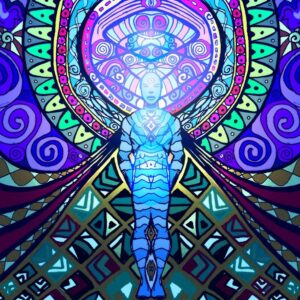In the Daoist system Buddhaic dhyāna is translated as the stability of “cosmic peace.”
The adept has left all worldly involvements and deliberations behind and, as the Zuowang lun says, has reached “the first foothold of Dao.” The state of mind he finds himself in is characterized by a twofold structure, perfect serenity on the inside and a “heavenly light” radiating on the outside. This pair is also described as tranquility and wisdom in accordance with Zhuangzi terminology or as concentration and insight following Buddhist usage. (ibid, pg. 98)
I actually experienced this form of “mind fasting” in seminary in the early 80’s. One instance that comes to mind occurred during my first semester after encountering a meditation session when two visiting Carthusian Monks taught us contemplative-meditation techniques. This was an odd occurrence since the Carthusians never leave their monastery, yet these two had “jumped the wall” (although much later they were tracked down by their superiors and returned to the charterhouse) of the Charterhouse of the Transfiguration in Mt. Equinox in Vermont and were making a tour of different seminaries throughout the US. I took these sessions in earnest and was soon encountering that form of “cosmic peace”:
A state in which attention is locked in on one specific datum to the total exclusion of all others; for practical purposes and with respect to ordinary awareness, the subject is in full trance and operatively unconscious; the lucidity is actually a description of the immediately ensuing moments, when the mind reawakes to the world around it, but sees that world in the mood of the just ended higher state of consciousness. The calm, undistracted post-dhyanic mind now sees clearly (ibid 97)
This means being oblivious of Heaven and Earth, doing away with beings. On the outside not examining time and space, on the inside never conscious of one’s body-self. Thus one can be boundless and unattached, going along with beings and fully according with all. (21)
Put quite simply and succinctly, I was in a state of entrancement. But my fellow seminarians wouldn’t stand for it. One day while eating a meal in common in the refectory, they began to ridicule me—they thought I was “losing it” which of course I would have (in the positive sense of the above) had they not prevented me. The common communal (read herd) identity was the rule of the day and anything outside of that was completely ostracized. This was clearly a sign that the eremitical route is best, being alone with the Alone:
Another recovery of primordial oblivion, a gradated progress toward mystical attainment, is outlined in a passage that describes Buliang Yi’卜梁倚progress under the guidance of Nüyu 女偊 (Woman Hunchback):
After three days, he was able to put the world outside himself. Once he could do this, I continued my support and after seven days, he was able to put beings outside himself. Once he could do this, he achieved the brightness of dawn, and after this, he could see his own aloneness. After he had managed to see his own aloneness, he could do away with past and present, and after that, he was able to enter [a state of] no life and no death.
This outlines the progress to complete oblivion and oneness with Dao in seven steps: the adept puts the world (1), beings (2), and life (3) outside himself—an activity interpreted by Guo Xiang as becoming “oblivious”. From here he goes on to attain the brightness of dawn (4) and the ability to see his own aloneness (5). That is to say, he finds an inner clarity or radiance, possibly like the bright light within that in many meditation traditions signals the opening to pure consciousness. In “aloneness,” moreover, he attains a state of nonduality which, according to Guo Xiang, means being free from all feelings about death.
“Not hating death,” he says, “means that one can be at peace with whatever one encounters; one is vast and open and without obstruction, seeing the cosmic pivot and acting with it”. “Seeing one’s aloneness” in his terms thus means “letting go of whatever one comes in contact with”
From here Buliang Yi abandons past and present (6) and finally enters a state completely beyond life and death (7), interpreted by Guo Xiang as “giving up all attachment to life and death”, going beyond time and all existence and reaching oneness with Dao. (ibid pg. 22)
What I ask you to take away from today’s blog is there’s nothing wrong with detachment from affairs—don’t allow others to breathe your own oxygen, otherwise you will permit them to smother you to death.
Only when the mind “adopts a relaxed attitude” and “finds placidity,” it is purified of thoughts and stops pursuing things, reaching an intermediate stage the Zuowang lun calls “Detachment from Affairs”. This signifies an inner separation from the world and new understanding of oneself and one’s needs. Most importantly it involves the realization that life goes on by itself, that things are neither good nor bad but just what they are. At this point worldly achievements become “mere gratifications of passions and desires” and one can live in purity, giving up “whatever is not essentially necessary to sustain life,” dedicating oneself solely to Dao. (ibid pg. 83)
This system of sitting in oblivion can serve to reverse the process of societal enslavement. Detachment from affairs, building on taming the mind through concentration exercises and karmic de-conditioning by putting some distance between self and society, is the point where adepts for the first time have a clearer vision of who they are now and who they ultimately should be. (ibid 87)

